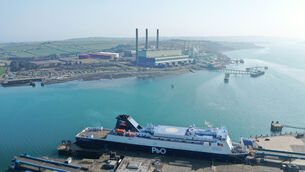Challenges against major projects go against common good, says Taoiseach

Enterprise minister Peter Burke, Taoiseach Micheál Martin, and Tánaiste Simon Harris at Government Buildings for the launch of the action plan on competitiveness and productivity. Picture: Sam Boal/Collins
Judicial reviews taken against major infrastructure projects are “unfairly and unduly” jeopardising the common good, the Taoiseach has said.
Micheál Martin criticised the use of judicial reviews as the Government published its new report on competitiveness and productivity, citing a review against the Dublin drainage scheme taken in recent weeks.










